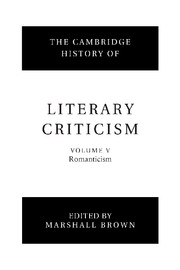Book contents
- Frontmatter
- Introduction
- 1 Classical standards in the period
- 2 Innovation and modernity
- 3 The French Revolution
- 4 Transcendental philosophy and Romantic criticism
- 5 Nature
- 6 Scientific models
- 7 Religion and literature
- 8 Language theory and the art of understanding
- 9 The transformation of rhetoric
- 10 Romantic irony
- 11 Theories of genre
- 12 Theory of the novel
- 13 The impact of Shakespeare
- 14 The vocation of criticism and the crisis of the republic of letters
- 15 Women, gender and literary criticism
- 16 Literary history and historicism
- 17 Literature and the other arts
- Bibliography
- Index
- References
4 - Transcendental philosophy and Romantic criticism
Published online by Cambridge University Press: 28 March 2008
- Frontmatter
- Introduction
- 1 Classical standards in the period
- 2 Innovation and modernity
- 3 The French Revolution
- 4 Transcendental philosophy and Romantic criticism
- 5 Nature
- 6 Scientific models
- 7 Religion and literature
- 8 Language theory and the art of understanding
- 9 The transformation of rhetoric
- 10 Romantic irony
- 11 Theories of genre
- 12 Theory of the novel
- 13 The impact of Shakespeare
- 14 The vocation of criticism and the crisis of the republic of letters
- 15 Women, gender and literary criticism
- 16 Literary history and historicism
- 17 Literature and the other arts
- Bibliography
- Index
- References
Summary
Most students of Romanticism will at some point find themselves confronting the challenge of theory and philosophy. This was not always so. The Romantics themselves certainly felt this challenge, perhaps most visibly in the career of Coleridge, but later commentators found ways to avoid it. John Stuart Mill's Autobiography presented a case for the therapeutic value of reading Wordsworth as a poet of the feelings rather than of ideas, and Matthew Arnold followed up with a recommendation that we ignore altogether the same poet's efforts at systematic thought and concentrate instead on his closeness to nature. Wordsworth was seen by both men as a great poet but a poor philosopher, and as such he was taken to instance the generic divide between poetry and philosophy that had preoccupied so many critics from Sir Philip Sidney on. The general notion of the ‘literary’ has indeed for the last four or five hundred years involved the assumption that literature is not philosophical, that it offers access to different sorts of truth and different imaginative experiences from those associated with abstract thought and logical argument. This same general notion has also supposed that literature is to be distinguished from history, from the accumulation and arrangement of facts and records and from the grand narratives of world-historical change.
Criticism, however, has not always kept itself so pure. In the 1970s, especially in the United States, Romanticism was visibly associated with the development of literary theory, and with a philosophic foundation. Since then, the most notable ambition in Romantic studies has been a historical one, an effort to situate the major writers within the life and thought of their times, and to fill in our knowledge of the literary tradition by recovering and discussing other writers (including many women) whom we have ignored or dismissed as of no interest. The effort at holding on to a model of the literary that is neither philosophical nor historical has always been under pressure from one or other of these alternatives, and sometimes both at once.
- Type
- Chapter
- Information
- The Cambridge History of Literary Criticism , pp. 72 - 91Publisher: Cambridge University PressPrint publication year: 2000
References
- 1
- Cited by

